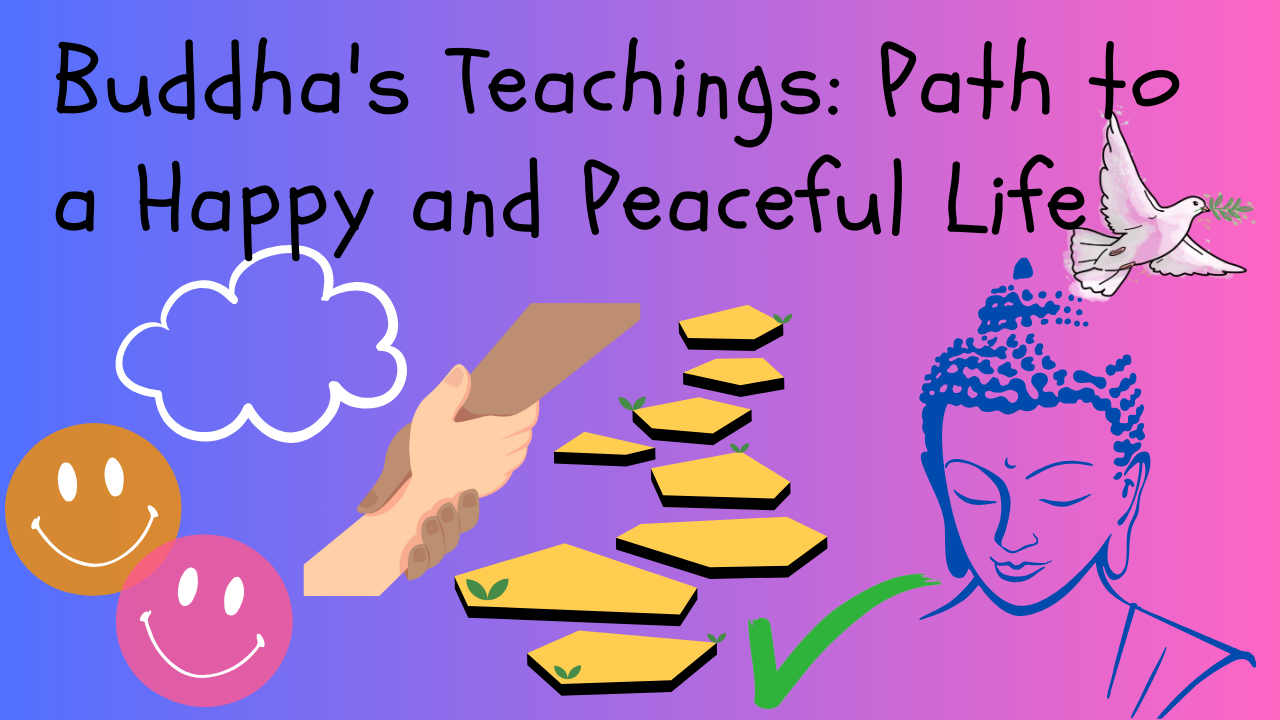Buddha, also known as Siddhartha Gautama, provided profound wisdom on how to lead a happy and peaceful life. His teachings, which form the foundation of Buddhism, emphasize mindfulness, compassion, and the pursuit of inner peace. Here, we explore some of the key teachings of Buddha and how they can be applied to modern life for happiness and tranquility.
1. The Four Noble Truths
The core of Buddha’s teachings is encapsulated in the Four Noble Truths:
- The Truth of Suffering (Dukkha): Life is filled with suffering and dissatisfaction. This suffering can be physical, emotional, or existential.
- “Life is suffering.”
- The Truth of the Cause of Suffering (Samudaya): Suffering arises from attachment and desire. Our cravings for pleasure, material possessions, and eternal life lead to dissatisfaction.
- “Attachment is the root of suffering.”
- The Truth of the End of Suffering (Nirodha): It is possible to end suffering by overcoming attachment and desire.
- “The end of suffering is the attainment of Nirvana.”
- The Truth of the Path to the End of Suffering (Magga): The path to the cessation of suffering is the Noble Eightfold Path.
- “There is a path to the end of suffering.”
2. The Noble Eightfold Path
The Noble Eightfold Path provides practical steps to achieve enlightenment and end suffering. These steps are grouped into three categories: wisdom, ethical conduct, and mental discipline.
- Right Understanding (Samma Ditthi): Understanding the nature of reality and the Four Noble Truths.
- “Understanding is the heartwood of well-spoken words.”
- Right Intention (Samma Sankappa): Having the right intention and commitment to ethical and mental self-improvement.
- “With our thoughts, we make the world.”
- Right Speech (Samma Vaca): Speaking truthfully and harmoniously, avoiding lying, gossip, and harmful speech.
- “Better than a thousand hollow words is one word that brings peace.”
- Right Action (Samma Kammanta): Acting ethically, avoiding harm to others, and leading a moral life.
- “To abstain from taking life, to abstain from taking what is not given, to abstain from sexual misconduct.”
- Right Livelihood (Samma Ajiva): Earning a living in a way that does not cause harm to others.
- “The wise who are harmless and live on the right livelihood, they are truly happy.”
- Right Effort (Samma Vayama): Cultivating a positive mindset and diligent effort towards self-improvement.
- “A jug fills drop by drop.”
- Right Mindfulness (Samma Sati): Developing awareness of the body, sensations, thoughts, and surroundings.
- “Do not dwell in the past, do not dream of the future, concentrate the mind on the present moment.”
- Right Concentration (Samma Samadhi): Practicing meditation to achieve a focused and tranquil mind.
- “Meditate… do not delay, lest you later regret it.”
3. The Practice of Loving-Kindness (Metta)
Loving-kindness, or Metta, is a central practice in Buddhism. It involves developing unconditional love and compassion for all beings, including oneself.
- “May all beings be happy; may all beings be without disease.”
- “Radiate boundless love towards the entire world.”
4. Impermanence (Anicca)
Understanding the impermanent nature of all things is crucial for finding peace. By recognizing that all experiences and possessions are transient, we can reduce attachment and suffering.
- “All conditioned things are impermanent — when one sees this with wisdom, one turns away from suffering.”
5. Mindfulness (Sati)
Mindfulness is the practice of being fully present in each moment, observing our thoughts and feelings without judgment. This awareness helps us to respond to situations with clarity and calmness.
- “The mind is everything. What you think you become.”
- “Be mindful of the present moment.”
6. Non-Self (Anatta)
Buddha taught that there is no permanent, unchanging self. Realizing the concept of non-self helps in letting go of ego and selfish desires, leading to a more harmonious life.
- “All phenomena are without a self.”
- “In the seen, there is only the seen.”
Conclusion
Buddha’s teachings offer timeless wisdom for achieving happiness and peace. By understanding and integrating the Four Noble Truths, practicing the Noble Eightfold Path, cultivating loving-kindness, recognizing impermanence, maintaining mindfulness, and embracing the concept of non-self, we can navigate life with greater serenity and fulfillment.
Embrace these teachings and let them guide you to a happier, more peaceful life. As Buddha said, “Peace comes from within. Do not seek it without.”



